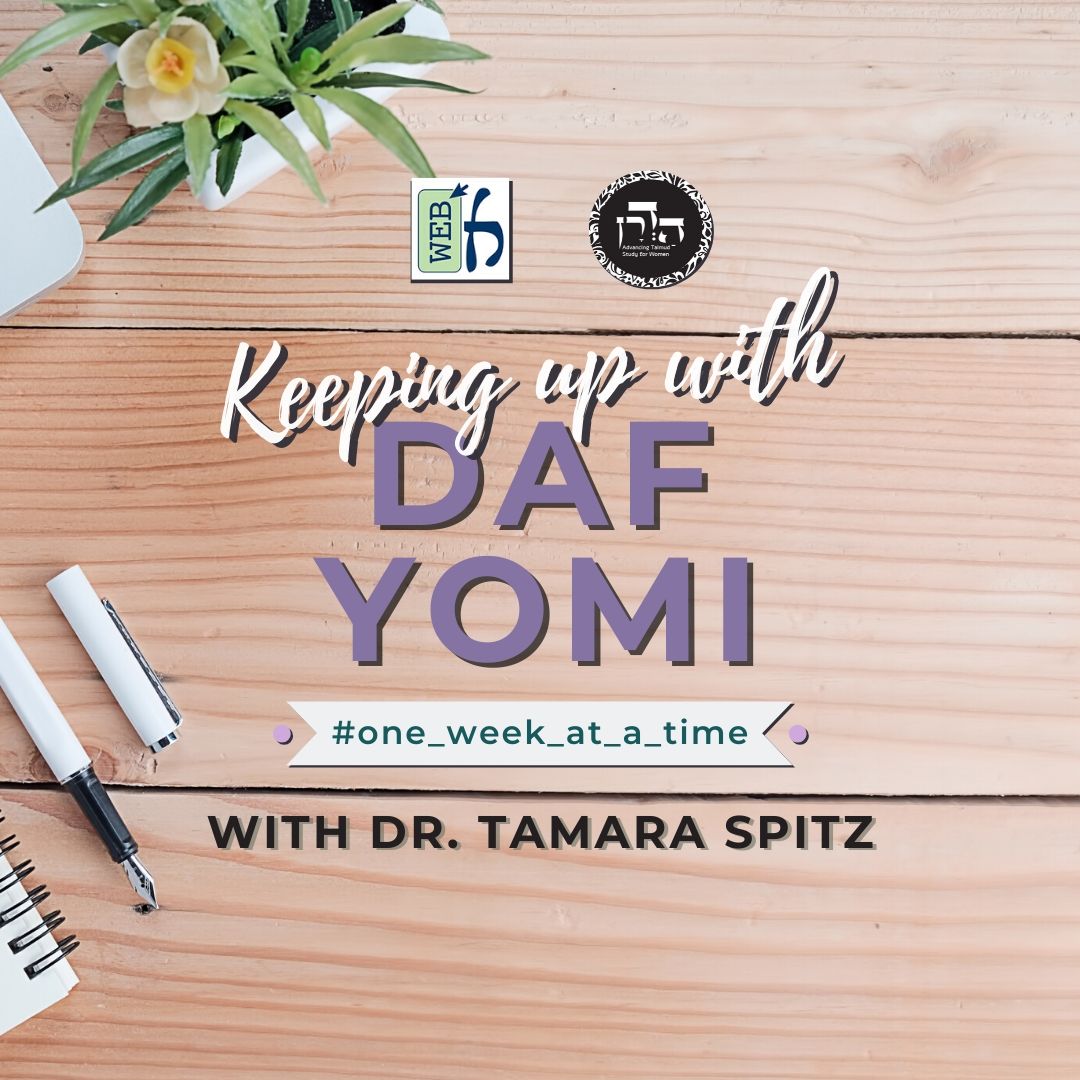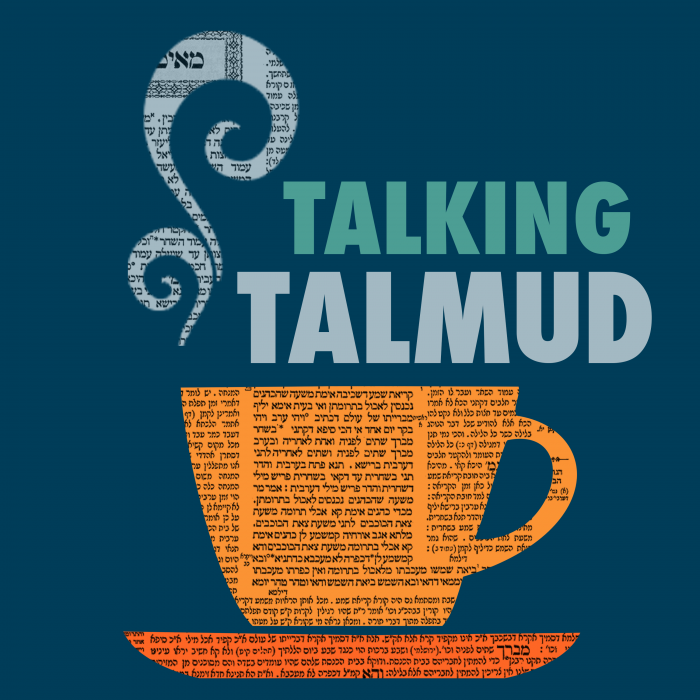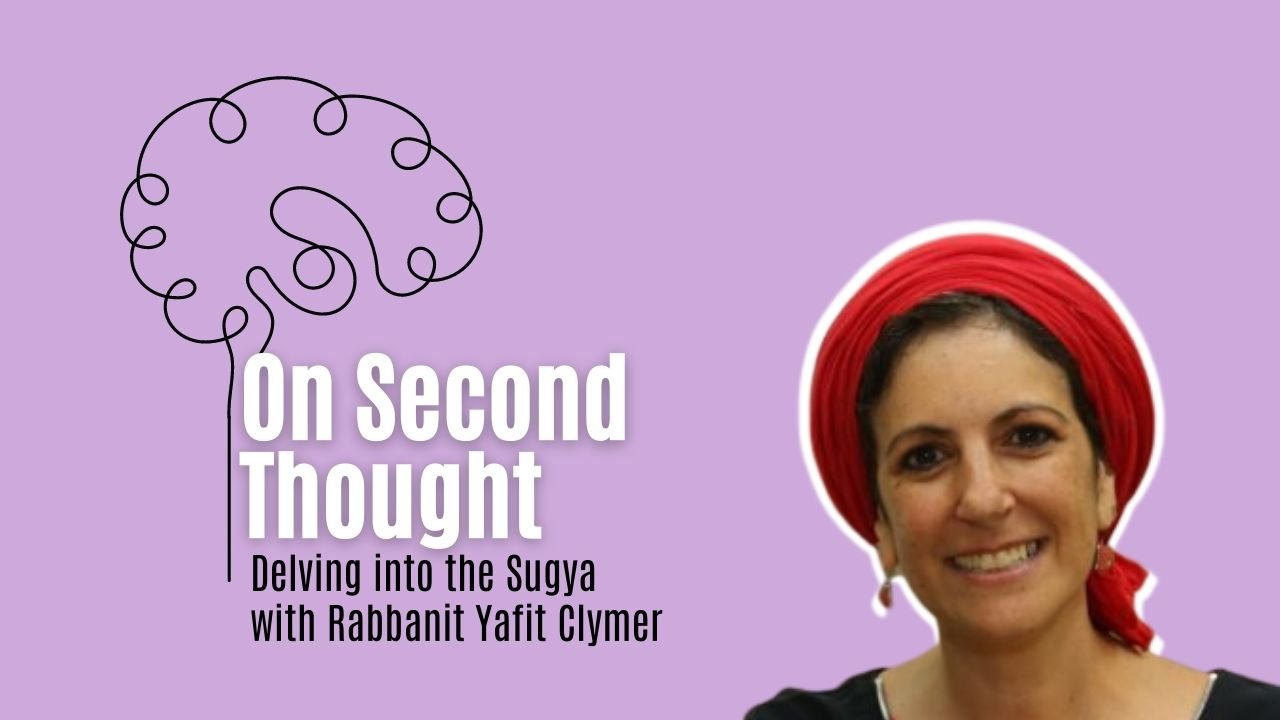If someone said, “My cow/door said I am a nazir if I stand up/open,” Beit Shamai and Beit Hillel disagree about whether the person becomes a nazir by this declaration. Rabbi Yehuda says, as in the previous Mishna, Beit Shamai meant this only if they explained it as referring to being a sacrifice and it then will be forbidden like a vow and not as a nazir. The Gemara questions how we can be discussing a talking cow/door? Rami bar Hama and Rava each bring explanations for the Mishna. Rava rejects Rami bar Hama’s explanation as it doesn’t match the wording of the Mishna. Rava’s explanation is also rejected, but he tries another two attempts to explain it until he finds an explanation that is not rejected.
Nazir 10
Share this shiur:
Want to dedicate learning? Get started here:


Summary
Today’s daily daf tools:
Today’s daily daf tools:
Delve Deeper
Broaden your understanding of the topics on this daf with classes and podcasts from top women Talmud scholars.
New to Talmud?
Check out our resources designed to help you navigate a page of Talmud – and study at the pace, level and style that fits you.
The Hadran Women’s Tapestry
Meet the diverse women learning Gemara at Hadran and hear their stories.
Nazir 10
אוֹ כְּמִנְחַת סוֹטָה — תִּקְדּוֹשׁ, אִי לָא — לָא. קָא מַשְׁמַע לַן דְּמַיְיתֵי מִן הַחִיטִּים.
or like the meal-offering of a sota, both of which are made of barley, it should become consecrated, and if it is not possible to volunteer a meal-offering from barley, it should not be a meal-offering at all. The mishna therefore teaches us that one nevertheless brings a meal-offering made from wheat. Rabbi Yoḥanan holds that the difficulty raised by Ḥizkiyya against his own explanation is inconclusive, and he need not have retracted it.
מַתְנִי׳ אָמַר: ״אָמְרָה פָּרָה זוֹ הֲרֵינִי נְזִירָה אִם עוֹמֶדֶת אֲנִי״, ״אוֹמֵר הַדֶּלֶת הַזֶּה הֲרֵינִי נְזִירָה אִם נִפְתָּח אֲנִי״ — בֵּית שַׁמַּאי אוֹמְרִים: נָזִיר, וּבֵית הִלֵּל אוֹמְרִים: אֵינוֹ נָזִיר. אָמַר רַבִּי יְהוּדָה: אַף כְּשֶׁאָמְרוּ בֵּית שַׁמַּאי, לֹא אוֹמְרִים אֶלָּא בְּאוֹמֵר ״הֲרֵי פָּרָה זוֹ עָלַי קׇרְבָּן, אִם עוֹמֶדֶת הִיא״.
MISHNA: If one said: This cow said: I am hereby a nazirite if I stand up; or if he said: This door says: I am hereby a nazirite if I am opened, Beit Shammai say he is a nazirite, and Beit Hillel say he is not a nazirite. Rabbi Yehuda said: Even when Beit Shammai say that the vow is effective, they say so only with regard to one who said: This cow is hereby forbidden to me as an offering if it stands up. In that case it is as if he took a vow that the cow is forbidden. However, Beit Shammai concede that although the vow takes effect, it is not a vow of naziriteship.
גְּמָ׳ פָּרָה מִי קָא מִישְׁתַּעְיָא? אָמַר רָמֵי בַּר חָמָא: הָכָא בְּמַאי עָסְקִינַן — כְּגוֹן שֶׁהָיְתָה פָּרָה רְבוּצָה לְפָנָיו, וְאָמַר: ״כִּסְבוּרָה פָּרָה זוֹ אֵינָהּ עוֹמֶדֶת — הֲרֵינִי נָזִיר מִבְּשָׂרָהּ אִם עָמְדָה מֵאֵלֶיהָ״. וְעָמְדָה מֵאֵלֶיהָ. וְהָלְכוּ בֵּית שַׁמַּאי לְשִׁיטָתָן וּבֵית הִלֵּל לְשִׁיטָתָן.
GEMARA: The Gemara asks: Does a cow speak? What is the meaning of the statement: A cow said: I am hereby a nazirite? Rami bar Ḥama said: With what are we dealing here? We are dealing with a case where there was a prone cow before him, and he tried, without success, to cause it to stand, and he said: This cow thinks it will not stand; I am hereby a nazirite and therefore will refrain from its flesh if it stands of its own accord, and in fact it stood of its own accord. Beit Shammai follow their standard approach and Beit Hillel follow their standard approach.
בֵּית שַׁמַּאי דְּאָמְרִי ״מִן הַגְּרוֹגְרוֹת וּמִן הַדְּבֵילָה״ — הָוֵי נָזִיר, הָכָא נָמֵי, כִּי אָמַר ״מִבְּשָׂרָהּ״ — הָוֵי נָזִיר. וּבֵית הִלֵּל אוֹמְרִים: לָא הָוֵי נָזִיר.
The Gemara explains: Beit Shammai, who say that one who vows to be a nazirite and therefore will refrain from dried figs and from cakes of dried figs is a nazirite, say that here too, when he says: I am hereby a nazirite and therefore will refrain from its flesh, is a nazirite. Since one does not utter a statement for naught, he is held to the first part of his statement: I am hereby a nazirite, and the words: And therefore will refrain from its flesh, are disregarded. And Beit Hillel say: He is not a nazirite.
וְהָא אַמְרוּהָ בֵּית שַׁמַּאי חֲדָא זִימְנָא! אָמַר רָבָא: תַּרְתֵּי תְּלָת. וְכֵן תָּנֵי רַבִּי חִיָּיא תַּרְתֵּי תְּלָת. וְכֵן אָמַר רַבִּי אוֹשַׁעְיָא תַּרְתֵּי תְּלָת.
The Gemara raises a difficulty: But if Rami bar Ḥama is correct, didn’t Beit Shammai already say this halakha one time? According to Rami bar Ḥama’s explanation, this mishna and the previous one differ only with regard to the examples provided, but the principle is identical. Rava said: It is normal for the Sages to cite two or three examples from different cases that offer novel perspectives, although they essentially reflect the same principle. And Rabbi Ḥiyya also taught two or three examples with regard to this same issue. And Rabbi Oshaya also said two or three examples.
וּצְרִיכִי, דְּאִי אִיתְּמַר בְּהָא גְּרוֹגְרוֹת וּדְבֵילָה: הָתָם הוּא דְּאָמְרִי בֵּית שַׁמַּאי הָוֵי נָזִיר, מִשּׁוּם דְּמִיחַלְּפָן בַּעֲנָבִים. אֲבָל בָּשָׂר בַּעֲנָבִים — לָא מִיחַלַּף. וְאִי אִיתְּמַר בָּשָׂר: הָכָא הוּא דְּאָמְרִי בֵּית שַׁמַּאי הָוֵי נָזִיר בְּבִישְׂרָא וְחַמְרָא. אֲבָל גְּרוֹגְרוֹת וּדְבֵילָה — לָא, קָא מַשְׁמַע לַן.
And all these cases are necessary, as, if it were stated only that he is a nazirite in this case of dried figs and cakes of dried figs, it could have been said that it is only there that Beit Shammai say he is a nazirite, since figs are confused with grapes, and it is reasonable to assume that he had grapes in mind. But meat is certainly not confused with grapes, and it could be that in the case of the mishna he is not a nazirite even according to Beit Shammai. And if it were stated only that he is a nazirite where he vowed that meat was forbidden to him, it could have been said that it is here that Beit Shammai say he is a nazirite because he was referring to the often-paired meat and wine, and it is reasonable to assume that he might have had wine in mind. But dried figs and cakes of dried figs are not paired with wine, so he should not be a nazirite. To counter that claim, the mishna teaches us that he is a nazirite in both cases.
וְאִי אִיתְּמַר הָנֵי תַּרְתֵּי: הָנֵי הוּא דְּקָאָמְרִי בֵּית שַׁמַּאי, אֲבָל דֶּלֶת אֵימָא מוֹדוּ לְהוּ לְבֵית הִלֵּל. וְאִי תַּנָּא דֶּלֶת: בְּהָא קָאָמְרִי בֵּית הִלֵּל, אֲבָל בְּהָךְ תַּרְתֵּי אֵימָא מוֹדוּ לְהוּ לְבֵית שַׁמַּאי, קָמַשְׁמַע לַן דְּלָא.
And if it were stated only that he is a nazirite with regard to these two cases of figs and meat, it could be said: It is in these cases that Beit Shammai say he is a nazirite, but in the case of a door, I will say they concede to Beit Hillel that such a statement certainly does not constitute a vow of naziriteship. Therefore, this case had to be stated as well. And conversely, if it taught only the case of a door, the opposite could be said, i.e., that it is in this case that Beit Hillel say there is no naziriteship, but in these two earlier cases I will say they concede to Beit Shammai that the individual has taken a vow of naziriteship. The tanna therefore teaches us that this is not the case; in fact, Beit Shammai hold that he is a nazirite in all three cases, and Beit Hillel hold that he is not.
אָמַר רָבָא: מִי קָתָנֵי ״אִם עָמְדָה מֵאֵלֶיהָ״? אֶלָּא אָמַר רָבָא: כְּגוֹן שֶׁהָיְתָה פָּרָה רְבוּצָה לְפָנָיו, וְאָמַר: ״הֲרֵי עָלַי קׇרְבָּן״. בִּשְׁלָמָא פָּרָה — בַּת קׇרְבָּן הִיא, אֶלָּא דֶּלֶת — בַּת קׇרְבָּן הִיא?! אֶלָּא אָמַר רָבָא: כְּגוֹן שֶׁהָיְתָה פָּרָה רְבוּצָה לְפָנָיו,
After providing the answer to one difficulty raised against Rami bar Ḥama’s explanation, Rava presents another problem. Rava said: Is the mishna teaching: If it stood of its own accord? The mishna states: If it stands, and does not mention the condition of: On its own accord. Rather, Rava said: The mishna is referring to a case where there was a prone cow before him, and he said: It is incumbent upon me to bring it as a nazirite offering, and in this way the individual accepts naziriteship upon himself. The Gemara raises a difficulty: Granted, a cow can be an offering, but can a door be an offering? How can his vow that a door should be an offering be considered an acceptance of naziriteship? Rather, Rava said it means the following: It is a case where there was a prone cow before him refusing to stand,
וְאָמַר: ״הֲרֵינִי נָזִיר מִיַּיִן אִם לֹא עָמְדָה״, וְעָמְדָה מֵאֵלֶיהָ. בֵּית שַׁמַּאי סָבְרִי: תּוּרְפֵּיהּ דְּהַאי גַּבְרָא מִשּׁוּם אוֹקֹמַהּ בִּידֵיהּ הוּא, וְהָא לָא אוֹקְמַהּ. וּבֵית הִלֵּל סָבְרִי: מִשּׁוּם דִּרְבִיעָא הוּא, וְהָא קָמַת.
and he said: I am hereby a nazirite and therefore will refrain from wine if it does not stand, since I will force it to do so, and it stood of its own accord, without him causing it to stand. Beit Shammai hold: This man’s intention [turpeih] is based upon him having it stand by his own hand, and he did not have it stand. Since he did not cause it to stand, his vow of naziriteship takes effect. And Beit Hillel hold: His intention is based upon the fact that it was prone, and now it has stood. Since the cow stood up it does not matter what caused it to stand, and his vow of naziriteship does not take effect.
אִי הָכִי, אֵימָא סֵיפָא, אָמַר רַבִּי יְהוּדָה: אַף כְּשֶׁאָמְרוּ בֵּית שַׁמַּאי, לֹא אָמְרוּ אֶלָּא בְּאוֹמֵר ״הֲרֵי הֵן עָלַי קׇרְבָּן״. פָּרָה מִי קָא מַתְפֵּיס בָּהּ מִידֵּי?
The Gemara asks: If so, say the latter clause of the mishna as follows: Rabbi Yehuda said: Even when Beit Shammai said the vow is effective they said so only with regard to one who said: They are hereby forbidden to me as an offering. But does he take a vow and extend any prohibition to the cow? Since according to this approach, he explicitly mentions naziriteship, the cow is not rendered forbidden but is merely the subject of a condition of the vow, so why does Rabbi Yehuda speak of a prohibition on the cow?
אֶלָּא כְּגוֹן דְּאָמַר ״הֲרֵינִי נָזִיר מִבְּשָׂרָהּ אִם לֹא עָמְדָה״, וְעָמְדָה מֵאֵלֶיהָ. בֵּית שַׁמַּאי סָבְרִי: תּוּרְפֵּיהּ דְּהָהוּא גַּבְרָא מִשּׁוּם אוֹקֹמַהּ בִּידֵיהּ הוּא, וְהָא לָא אוֹקְמַהּ. וּבֵית הִלֵּל סָבְרִי: תּוּרְפֵּיהּ דְּהַאי גַּבְרָא מִשּׁוּם דִּרְבִיעָא, וְהָא קָמַת.
The Gemara offers another explanation: Rather, the mishna is referring to a case where he said: I am hereby a nazirite and therefore will refrain from its flesh if it does not stand, and it stood of its own accord. Beit Shammai hold: That man’s intention is based upon him having it stand by his own hand, and he did not have it stand. Since he did not cause it to stand, his vow of prohibition takes effect. And Beit Hillel hold: This man’s intention is based upon the fact that it was prone, and now it has stood, so his vow does not take effect.
וּבֵית הִלֵּל סָבְרִי אִי לָא קָמַת הָוֵי נָזִיר? וְהָאָמְרִי ״מִבְּשָׂרָהּ״ — לָא הָוֵי נָזִיר!
The Gemara asks: And do Beit Hillel hold that if the cow does not stand he will be a nazirite? But didn’t they say that if one states: I am hereby a nazirite and therefore will refrain from the cow’s flesh, he is not a nazirite, just as they ruled in a case where one states that he is a nazirite from dried figs?
לְטַעְמַיְיהוּ דְּבֵית שַׁמַּאי קָאָמְרִי: לְדִידַן אֲפִילּוּ לָא קָמַת, נָמֵי לָא הָוֵי נָזִיר. לְדִידְכוּ דְּאָמְרִיתוּ הָוֵי נָזִיר, אוֹדוֹ לַן מִיהַת דְּתוּרְפֵּיהּ דְּהָדֵין גַּבְרָא מִשּׁוּם דִּרְבִיעָא, וְהָא קָמַת. וּבֵית שַׁמַּאי: לָאו תּוּרְפֵּיהּ דְּהַאי גַּבְרָא מִשּׁוּם אוֹקֹמַהּ בִּידֵיהּ הוּא, וְהָא לָא אוֹקְמַהּ.
The Gemara answers: They stated their opinion in accordance with the reasoning of Beit Shammai: According to our opinion, even if the cow does not stand he is also not a nazirite, since naziriteship takes effect only if he vowed that products of the vine are forbidden to him. However, according to your reasoning that you say he is a nazirite, in any event concede to us that this man’s intention is based upon the fact that the cow was prone, and it has stood, so the naziriteship should not take effect. And Beit Shammai hold: Isn’t this man’s intention based upon him having it stand by his own hand, and he did not have it stand? Since his condition was not fulfilled, the naziriteship does not take effect.






















